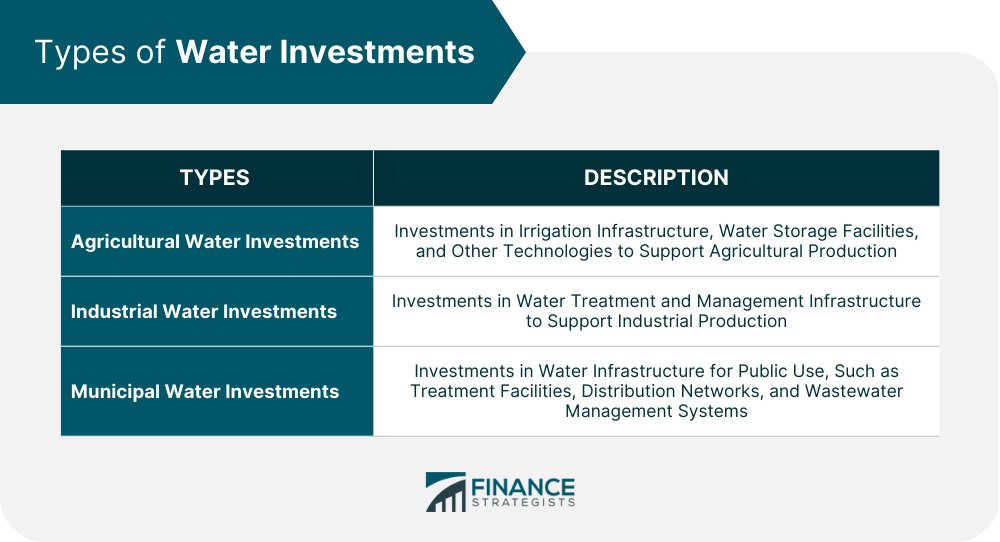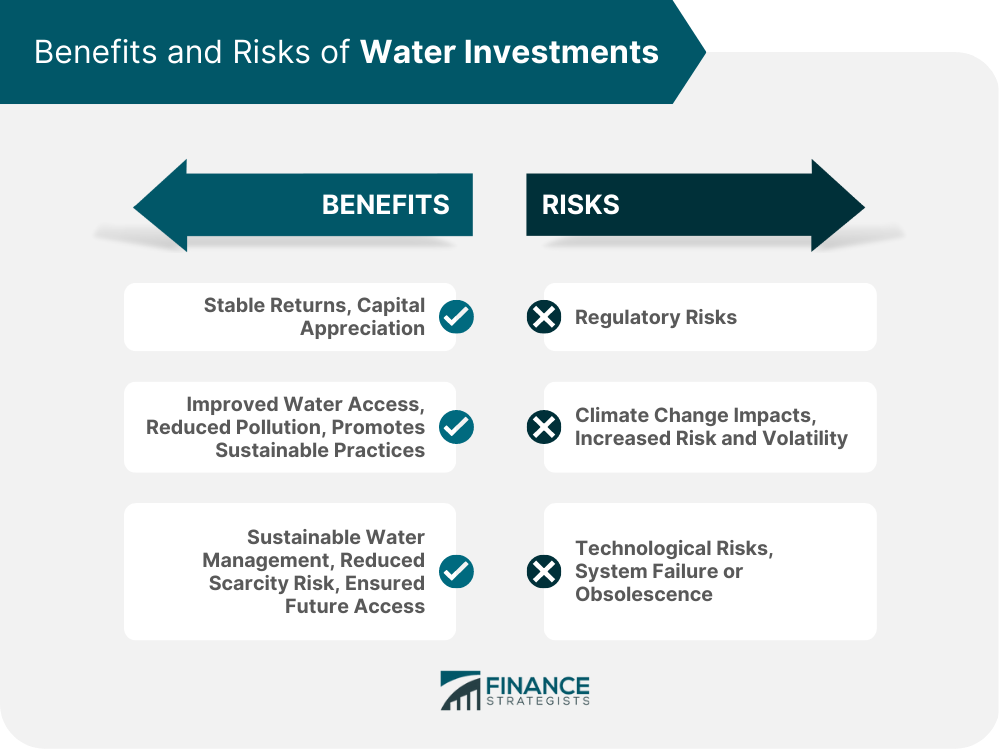Water investments are investments made in the management, development, and utilization of water resources to support economic growth and social development. These investments are made in various sectors, including agriculture, industry, and municipal services. Water investments play a critical role in ensuring the sustainable management and development of water resources. They help to improve water infrastructure, promote sustainable water use, and support economic growth and social development. Agricultural water investments are investments made in irrigation infrastructure, water storage facilities, and other water management technologies to support agricultural production. These investments are essential for food security and to ensure that farmers can adapt to changing weather patterns and drought conditions. Industrial water investments are investments made in water treatment and management infrastructure to support industrial production. This type of investment is important for ensuring that industries have access to reliable and high-quality water resources, which can help to reduce costs and increase efficiency. Municipal water investments refer to investments made in water infrastructure for public use, such as water treatment facilities, distribution networks, and wastewater management systems. This type of investment is essential for ensuring that people have access to safe and clean water for drinking, cooking, and sanitation. Water investments can provide financial benefits to investors, including stable returns and long-term capital appreciation. As demand for water increases, the value of water investments is likely to rise, making them an attractive option for investors. Water investments can have significant social and environmental benefits, such as improving access to clean water, reducing water pollution, and promoting sustainable water management practices. These benefits can have a positive impact on the communities in which water investments are made, as well as on the environment as a whole. Water investments can provide long-term benefits by promoting sustainable water management practices, which can help to ensure that water resources are available for future generations. This can help to reduce the risk of water scarcity and ensure that people have access to clean and safe water for years to come. Water investments can be subject to regulatory risks, such as changes in water policy or regulations, which can impact the value of water investments. Investors should be aware of the regulatory environment in which they are investing and stay up-to-date on any changes that may impact their investments. Climate change can have a significant impact on water resources, such as changing weather patterns and increasing the frequency and severity of droughts and floods. Water investments may be impacted by these climate risks, which can make them more volatile and risky. Water investments may be subject to technological risks, such as the failure of water treatment systems or the development of new technologies that may render existing investments obsolete. Investors should be aware of these risks and carefully assess the technological landscape before making investments. Direct investments in water infrastructure or water-related companies involve purchasing assets or stocks outright. This strategy allows investors to have more control over their investments and potentially generate higher returns. Indirect investments in water can involve investing in funds or companies that have exposure to water-related assets or industries, such as agriculture, food, or energy. Indirect investments can provide investors with a more diversified portfolio and potentially lower risk. Public-private partnerships involve collaboration between government and private companies to develop, manage, or finance water-related infrastructure projects. These partnerships can provide investors with access to large-scale projects and potentially higher returns, while also contributing to the development of water infrastructure in the community. Investors should consider the availability and quality of water resources in the region where they are investing. The scarcity or poor quality of water can affect the success of water-related investments. Investors should also consider the economic and political stability of the region where they are investing. Unstable political or economic conditions can create risks for water-related investments. The regulatory environment in the region where investors are investing can have a significant impact on the success of water-related investments. Investors should be aware of the regulations governing water use and management and how they may impact their investments. The impact of climate change on water resources can create significant risks for water-related investments. Investors should assess the potential impact of climate change on the availability and quality of water resources in the region where they are investing. Investing in water is essential for ensuring the sustainable management and development of water resources. Water investments can provide financial, social, and environmental benefits, but they also come with risks. Investors should carefully consider the types of water investments, investment strategies, and factors to consider when making water-related investments to ensure the success of their investments while contributing to the sustainable development of water resources. Incorporating water investments into a diversified portfolio can not only contribute to sustainable development but also provide opportunities for stable returns and long-term growth, making it a valuable addition to wealth management strategies.Definition of Water Investments
Types of Water Investments
Agricultural Water Investments
Industrial Water Investments
Municipal Water Investments

Benefits of Water Investments
Financial Benefits
Social and Environmental Benefits
Long-Term Benefits
Risks of Water Investments
Regulatory Risks
Climate Risks
Technological Risks

Water Investment Strategies
Direct Investments
Indirect Investments
Public-Private Partnerships
Factors to Consider in Water Investments
Water Availability and Quality
Economic and Political Stability
Regulatory Environment
Climate Change Impact
Conclusion
Water Investments FAQs
Water investments are investments made in the management, development, and utilization of water resources to support economic growth and social development. They are important because water is a fundamental resource that sustains life and drives economic growth, and investing in water can help ensure its sustainable management and development.
There are three main types of water investments: agricultural water investments, industrial water investments, and municipal water investments. Agricultural water investments involve investing in irrigation infrastructure, water storage facilities, and other water management technologies to support agricultural production. Industrial water investments involve investing in water treatment and management infrastructure to support industrial production. Municipal water investments involve investing in water infrastructure for public use, such as water treatment facilities, distribution networks, and wastewater management systems.
Water investments can provide financial, social, and environmental benefits. Financial benefits include stable returns and long-term capital appreciation. Social and environmental benefits include improving access to clean water, reducing water pollution, and promoting sustainable water management practices. Long-term benefits include promoting sustainable water management practices, which can help ensure that water resources are available for future generations.
Water investments can be subject to regulatory risks, such as changes in water policy or regulations, which can impact the value of water investments. Climate risks, such as changing weather patterns and increasing the frequency and severity of droughts and floods, can also have a significant impact on water investments. Technological risks, such as the failure of water treatment systems or the development of new technologies that may render existing investments obsolete, can also be a concern.
Investors should consider the availability and quality of water resources in the region where they are investing, the economic and political stability of the region, the regulatory environment governing water use and management, and the potential impact of climate change on water resources. They should also carefully assess the types of water investments and investment strategies available to them to ensure the success of their investments while contributing to the sustainable development of water resources.
True Tamplin is a published author, public speaker, CEO of UpDigital, and founder of Finance Strategists.
True is a Certified Educator in Personal Finance (CEPF®), author of The Handy Financial Ratios Guide, a member of the Society for Advancing Business Editing and Writing, contributes to his financial education site, Finance Strategists, and has spoken to various financial communities such as the CFA Institute, as well as university students like his Alma mater, Biola University, where he received a bachelor of science in business and data analytics.
To learn more about True, visit his personal website or view his author profiles on Amazon, Nasdaq and Forbes.











